
|
Greatest Films (of the 20th Century) Summaries - Part 2 |
|
The
Third Hundred Greatest Films (of the 20th Century) Summaries - Part 2 (Links to Comprehensive Film Reviews) Selection Criteria |
B (continued) |
 The
Birds (1963) The
Birds (1963)Starring: Tippi Hedren, Rod Taylor, Jessica Tandy, Suzanne Pleshette, Veronica Cartwright Director: Alfred Hitchcock Another modern Hitchcock thriller/masterpiece - his first film with Universal Studios. Loosely based upon a short story by Daphne Du Maurier, it is the apocalyptic story of a northern California coastal town (Bodega Bay) filled with an onslaught of seemingly unexplained, arbitrary and chaotic attacks of ordinary birds - not birds of prey. Ungrammatical advertising campaigns emphasized: "The Birds Is Coming." The dark film hinted that the bird attacks were punishment for the failings of the relationships between the main characters. This Technicolor feature came after Psycho (1960) - another film filled with 'bird' references. The film's technical wizardry was extraordinary, especially in the film's closing scene (a complex, trick composite shot) - the special visual effects of Ub Iwerks were nominated for an Academy Award (the film's sole nomination), but the Oscar was lost to Cleopatra (1963). Hundreds of birds (gulls, ravens, and crows) were trained for use in some of the scenes, while mechanical birds and animations were employed for others. The film's non-existent musical score was replaced by an electronic soundtrack (including simulated bird cries and wing-flaps), with Hitchcock's favorite composer Bernard Herrmann serving as a sound consultant. Hitchcock introduced a 'fascinating new personality' for the film - his unknown successor to Grace Kelly - a cool, blonde professional model named 'Tippi' Hedren (the mother of Melanie Griffith), in her film debut in a leading role. Hedren also appeared in Hitchcock's next picture Marnie (1964), and reprised her Birds character in a supporting role in a dreadful made-for-TV sequel, The Birds II: Land's End (1994). Academy Award Nominations: 1, Best Visual Effects. |
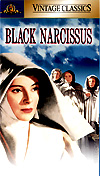 Black Narcissus (1947) Black Narcissus (1947)Starring: Deborah Kerr, David Farrar, Jean Simmons, Kathleen Byron, Sabu Directors: Michael Powell, Emeric Pressburger The provocative and richly-Technicolored spiritual and erotic melodrama (with Oscar-winning cinematography by Jack Cardiff) from the UK was based on the 1939 novel by Rumer Godden. The dazzling cinematographic masterpiece, a psychological drama, told about a convent (with a village school and hospital infirmary) and group of five sexually-repressed British Anglican nuns in the far remote Himalayans, with breath-taking imagery of the donated exotic sultan's palace (once a bordello) with a bell tower on the edge of a 9,000 ft. precipice. The convent was led by devout and pious Sister Superior Clodagh (Kerr) who was being haunted and tormented by memories of a past lover in Ireland. One of the unstable, sexually-conflicted and spurned Anglican nuns, mentally insane Sister Ruth (Byron), was driven mad by repressed and starved sexuality and jealousy after turning mad with lust for a government intermediary - the sexy yet cynical and very manly British agent Mr. Dean (Farrar). Amidst the atmosphere were violent winds, mysterious drum-beats, and strange native rituals. In a sideplot, 'the Young General' (Sabu), heir to the throne of the princely state, arrived at the convent to be educated, where he became infatuated with a sexually-intriguing, lower-caste native dancing girl named Kanchi (Simmons).In the unnerving, climactic conclusion, Sister Ruth renounced her nunhood vows of celibacy, adorned herself in a bright-red forbidden dress, applied matching lipstick (symbolizing her break with the nunnery), and sought to lethally attack her rival Sister Clodagh. The cathartic scene ended when intended victim Clodagh was saved from death as she grabbed hold of the bell-tower rope after being pushed toward the precipice by jealous and vengeful Sister Ruth, who lost her balance and fell to her death. Academy Awards, 2: Best Color Cinematography (Jack Cardiff), and Best Color Art Direction-Set Decoration. |
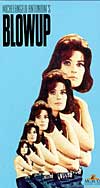 Blow-Up
(1966) Blow-Up
(1966)Starring: David Hemmings, Vanessa Redgrave, Sarah Miles, John Castle, Peter Bowles, Jane Birkin, Gillian Hills, Veruschka Director: Michelangelo Antonioni A thought-provoking, art-house masterpiece from Italian director Michelangelo Antonioni - a view of the world of mod fashion, and an engaging, provocative murder mystery that examines the existential nature of reality through photography. It was Antonioni's first film in English, and quickly became one of the most important films of its decade, and a milestone in liberalized attitudes toward film nudity and expressions of sexuality. [The film in some respects resembles Hitchcock's Rear Window (1954), and proved influential for other young filmmakers: i.e., Coppola's The Conversation (1974), and De Palma's Blow Out (1981).] A desensitized-to-life, nihilistic, high-fashion London free-lance photographer Thomas (Hemmings), who lives a mid-60s life of excess (riches, fame, and women), becomes bored with his lucrative career of glamour photography. So he resorts to photographing, in documentary style, the seamy and sordid side of life in London, in flophouses and slums. Innocently, he takes candid photos in a deserted park of a lover's tryst-rendezvous between a kerchief-wearing, enigmatic woman (Redgrave) and a middle-aged, gray-haired man in a light-gray suit. She pursues him to ask for the illicit photos, as he imagines that he has witnessed a scene of sexual intrigue - never thinking that he may have accidentally obtained visual, criminal evidence of a murder. The climax is a suspenseful, obsessive sequence of the photographer processing and blowing up several pictures from his park visit, and magnifying them larger and larger to poster size. As tension heightens, he pins the pictures on the wall of his living room - in sequence - giving them life as if they were individual frames in a motion picture. Ultimately, they reveal a riveting possibility. In the film's finale is another indelible, symbolic image emphasizing the slim line between objective reality and illusion - a group of pantomiming students in white-face playing an invisible game of tennis with non-existent rackets and balls - and audience. Academy Award Nominations: 2, Best Director--Michelangelo Antonioni, Best Original Screenplay--Michelangelo Antonioni, Tonino Guerra, Edward Bond. |
 Bull
Durham (1988) Bull
Durham (1988)Starring: Kevin Costner, Susan Sarandon, Tim Robbins, Trey Wilson, Robert Wuhl Director: Ron Shelton First-time director Ron Shelton, a former second-baser in the minor leagues, has made a prominent career of sports movies that realistically examine the participants' heart, both in terms of sportsmanship and in terms of romance. His writing (and directing) credits have also included: The Best of Times (1986) (football), White Men Can't Jump (1992) (basketball, also directed), Blue Chips (1994) (basketball), Cobb (1994) (baseball, also directed), The Great White Hype (1996) (boxing), Tin Cup (1996) (golf, also directed), and Play It To the Bone (2000) (boxing, also directed). This humorous romantic drama about the Carolina minor leagues is the quintessential modern sports film of America's greatest game. Kevin Costner stars as "Crash" Davis, a veteran, romantic-minded, minor league catcher who has to tutor wild young, rookie pitcher Ebby Calvin "Nuke" LaLoosh (Robbins) for the mediocre Durham Bulls, while simultaneously competing with him - in a love triangle - for the affections of English teacher and sexually-seductive baseball groupie Annie Savoy (Sarandon, Robbins' real-life 'wife'). Bull Durham would only receive a single Oscar nomination for Shelton's writing, while Costner's next film would be another baseball film, the mystical Field of Dreams (1989), based on the W.P. Kinsella book. (Costner and Shelton would reunite for Tin Cup (1996).) Academy Award Nominations, 1: Best Original Screenplay--Ron Shelton. |
 Bus
Stop (1956) Bus
Stop (1956)Starring: Marilyn Monroe, Don Murray, Arthur O'Connell, Betty Field, Eileen Heckart, Robert Bray, Hope Lange Director: Joshua Logan Aka The Wrong Kind of Girl, this comedy/drama, adapted by George Axelrod (who also co-wrote The Seven Year Itch (1955) also starring Monroe) and based on the hit Broadway play by William Inge, was Marilyn Monroe's first "serious" lead role. She plays Cherie, a fifth-rate, hillbilly saloon-bar singer in Phoenix at the Blue Dragon Cafe, originally from the Ozarks, whose dream is to go to Hollywood. Her path crosses that of a naive, callow and rude cowboy from Montana in town for a rodeo, Beauregard 'Bo' Decker (Murray in his film debut), who immediately is smitten by his sweet 'angel.' The most memorable moment of Bus Stop is Monroe's famous torch-song performance of "That Old Black Magic" for an unappreciative audience, mixing sensuousness with a wistfully sad, soulful quality. The country bumpkin persistently tries to woo Cherie (whom he crudely calls Cherry) - and forcefully kidnaps her to take her home with him. They become stranded during a blizzard at the familiar roadside stop Grace's Diner in Idaho, where she eventually falls for her abductor. Widely considered the best role of Monroe's career, it mixed comedy with dark pathos. The film proved Monroe was a more-than-capable actress reflecting her skillful acting talent and some of her own personal insecurities. It earned her better roles opposite such stars as Jack Lemmon, Tony Curtis, Clark Gable, and Laurence Olivier. The film later inspired a 1961-62 TV series of the same name. Academy Award Nominations: 1, Best Supporting Actor--Don Murray. |
C |
 Crimes
and Misdemeanors (1989) Crimes
and Misdemeanors (1989)Starring: Martin Landau, Anjelica Huston, Woody Allen, Alan Alda, Mia Farrow, Sam Waterston, Jerry Orbach, Claire Bloom, Joanna Gleason Director: Woody Allen Perhaps Woody Allen's darkest, most somber movie, Crimes and Misdemeanors (1989) takes a long, provocative, and ultimately downbeat look at morality with its ensemble cast. Dual stories about Manhattanites, each composing about one-half of the film, are interwoven together, and interconnected by the character of a mutual friend - a lone holy man and rabbi named Ben (Waterston) who is going blind. The first story deals with Judah Rosenthal (Landau), a wealthy, law-abiding, successful, and well-respected ophthalmologist, who was married to Miriam (Bloom). However, an enraged and obsessed flight attendant and ex-lover Dolores Paley (Huston), with whom he has been cheating on his wife, threatens to divulge the scandal and ruin his life. With this dilemma facing him, Judah is forced to take extreme measures - the contemplation of murder of his mistress by contacting his seldom-seen brother Jack (Orbach) with Mafia connections. His guilt forces him to revisit his past and ask basic questions about his own values, the unfairness of life, virtue, 'the eyes of God,' a god-less universe, justice for evil-doing, and unequal punishment of the wicked. Meanwhile, in the lighter-spirited other half of the movie, Cliff Stern (Allen), a dedicated but struggling, serious documentary filmmaker (who is married but in the process of separating from wife Wendy (Gleason)), is reluctantly forced to direct a film of his despised rival - his superficial, vain but extremely successful brother-in-law and TV sit-com producer Lester (Alda). Complicating matters, Stern must compete with Lester over the object of his impossibly-romantic affections - the documentary's attractive production assistant named Halley Reed (Farrow). Academy Award Nominations: 3, including Best Director--Woody Allen, Best Supporting Actor--Martin Landau, Best Original Screenplay--Woody Allen. |
D |
 Dark
Victory (1939) Dark
Victory (1939)Starring: Bette Davis, George Brent, Humphrey Bogart, Geraldine Fitzgerald, Ronald Reagan Director: Edmund Goulding Warner Bros. studios' sentimental, tragic and moving melodrama (a "weepie" or "woman's picture") - made in Hollywood's most famous and competitive year. The adult drama contains an electrifying, compelling, tour de force, tear-jerking performance from its major star -- Bette Davis. It was a bit of a risk for the movie studio to make and publicize an intense film about a terminally-ill patient with "prognosis negative." The protagonist is a young socialite-heiress named Judith Traherne (Davis), who suffers from a brain tumor and ultimately falls in love with her supportive and dedicated doctor Frederick Steele (Brent). In the midst of her deadly illness, she comforts her best friend Ann King (Fitzgerald), and courageously meets her fate when her eyesight dims. She climbs her stairs for the last time - accompanied by Max Steiner's swelling score in the film's finale. A title from a film trailer proclaimed: "The love story no woman will ever forget!" The film's screenplay by Casey Robinson was based on the brief and unsuccessful (due to its morbid subject matter) mid-30s Broadway play (starring Tallulah Bankhead) of the same name by George Emerson Brewer, Jr., and Bertram Bloch. Dark Victory was the second of Davis' four films with director Edmund Goulding - the others were That Certain Woman (1937), The Old Maid (1939), and The Great Lie (1941). Humphrey Bogart was completely miscast in a minor role as Michael O'Leary - an Irish stable groom/trainer, although Ronald Reagan as Alec Hamin, a bar-hopping, slightly decadent playboy, was effectively believable. The film was remade as Stolen Hours (1963) and as a made-for-TV movie in 1976 with Elizabeth Montgomery. Academy Award Nominations: 3, including Best Picture, Best Actress--Bette Davis (a two-time Oscar winner already, with her third Oscar nomination in five years, and her second of five consecutive nominations), Best Original Score--Max Steiner. |
 The
Day the Earth Stood Still (1951) The
Day the Earth Stood Still (1951)Starring: Michael Rennie, Patricia Neal, Hugh Marlowe, Sam Jaffe, Billy Gray, Frances Bavier, Lock Martin Director: Robert E. Wise One of the seminal science fiction films of motion picture history, The Day the Earth Stood Still (1951) is based on Edmund H. North's adaptation of the short story "Farewell to the Master" by Harry Bates. Much like the "drive in movies" of the 1950's, such as The War of the Worlds (1953), Forbidden Planet (1956), and Invasion of the Body Snatchers (1956), this influential, fantasy sci-fi film featured state-of-the-art visual effects and salient social commentary on the Cold War and warfare. The film not only examined wider issues of politics and society, but also at human emotions and frailties. This cautionary science fiction parable begins with the landing of a spacecraft on the Ellipse in Washington, DC. A benevolent, interplanetary alien in humanoid form, Klaatu (Rennie) brings a message of good-will and peace, but he is shot by a nervous soldier. His massive robotic companion Gort (Martin) vaporizes the offensive weapons, and afterwards, Klaatu is hospitalized. Then, he causes a panic when he demands to speak to all of the representatives of Earth's governments. He escapes and goes into hiding posing as an Earthling named Carpenter while residing with a human family (single mother/widow Helen (Neal) and her son Bobby (Gray)) and others in a boarding house, in order to observe their lives, and meanwhile makes an attempt to establish contact with Earth's leading scientist Dr. Bernhardt (Jaffe). Klaatu's demonstration of power over the industrial complex -- by stopping power everywhere for half an hour -- ends up tragically. One of the most famous phrases in science fiction history is recited by Helen to stop Gort's rampage when Klaatu is killed: "Gort, Klaatu barada nikto." The film ends with the alien visitor's resurrection and a warning-proclamation. With a memorable score by Bernard Herrmann. No Academy Award Nominations. It was remade in 2008 by director Scott Derrickson, starring Keanu Reeves as Klaatu and Jennifer Connelly as Helen. |
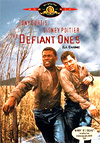 The Defiant
Ones (1958) The Defiant
Ones (1958)Starring: Tony Curtis, Sidney Poitier, Theodore Bikel, Cara Williams, Lon Chaney, Jr., Claude Akins Director: Stanley Kramer Liberal director-filmmaker Stanley Kramer, well-known for directing heavy-handed, social issues dramas (such as Inherit the Wind (1960) and Guess Who's Coming to Dinner (1967)), helmed this social commentary film about racism. Two chain-gang convicts in the 1950s South - bigoted white Southerner John "Joker" Jackson (Curtis) (convicted of armed robbery) and black Noah Cullen (Poitier, the first black actor to star in mainstream Hollywood films in non-stereotyped roles) (incarcerated for assault and battery) were shackled together. When they escaped from an overturned transport truck during a rainstorm, they had to cooperate with each other and put aside their racial animosities as they evaded the oppressive search of the police. Held together by a 29 inch steel chain, they were manacled to each other, and only bound by their will and determination to escape. Their pursuit was headed up by a local "humanitarian" - the liberal and compassionate Sheriff Max Muller (Bikel), with other more redneck state troopers and police officers with vicious tracking dogs. Although captured at Jackson's former place of work (a turpentine camp 60 miles to the north), they were confronted by Mack (Akins) and a threatening lynch mob, although Big Sam (Chaney) stepped in and halted the bloodthirsty injustice, and then released the two to escape in the middle of the night. At an isolated farm house, they were cared for by needy, lonesome, abandoned and love-starved single mother (Williams). Her devious plan to send Cullen off into the swamp while she ran off with Jackson to the city backfired when she betrayed his trust. Jackson chased after Cullen and told him: "That woman told you wrong." The film's classic image was of their clapsed white and black hands of the two desperately trying to help each other board a speeding train - Cullen reached back to pull Jackson up, but couldn't save him ("I can't make it! I can't make it!") and sacrificed his own freedom by jumping off. In the conclusion, Cullen defiantly sang the blues song "Long Gone" - with the wounded Jackson lying in his arms, before the two were apprehended by Sheriff Muller. Academy Award Nominations: 9, including Best Picture, Best Director, Best Actor (Tony Curtis), Best Actor (Sidney Poitier), Best Supporting Actor (Theodore Bikel), Best Supporting Actress (Cara Williams), Best Film Editing. Academy Awards: 2 - Best B/W Cinematography and Best Writing, Story and Screenplay - Written Directly for the Screen (Nedrick Young and Harold Jacob Smith). |
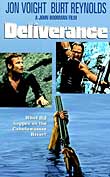 Deliverance
(1972) Deliverance
(1972)Starring: Jon Voight, Burt Reynolds, Ned Beatty, Ronny Cox Director: John Boorman British director John Boorman's gripping, absorbing, action-adventure film - about four suburban Atlanta businessmen-friends who encounter a disastrous rite-of-passage during a summer weekend's river-canoeing trip. Its famous tagline was: "This is the weekend they didn't play golf." The buddy group, composed of Ed Gentry (Voight), ultra-macho Lewis Medlock (Reynolds), fearful weakling Bobby Trippe (Beatty), and Drew Ballinger (Cox) face a nightmarish situation when they come upon the rapids and local hillbillies who degrade and terrorize them. The stark, uncompromising film was one of the first to deal with the theme of city-dwellers against the powerful, territorial forces of nature and the wilderness. The exciting box-office hit, most remembered for its banjo dueling and brutal, visceral action (and sexually-violent sodomy scene), was based on James Dickey's adaptation of his own 1970 best-selling novel (his first) of the same name - he contributed the screenplay and acted in a minor part as the town sheriff. The beautifully photographed film (by cinematographer Vilmos Zsigmond), shot entirely on location (in northern Georgia's Rabun County, bisected by the Chattooga River), was the least-nominated film among the other Best Picture nominees. Academy Award Nominations: 3, including Best Picture, Best Director--John Boorman, Best Film Editing. |
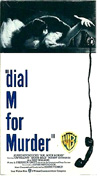 Dial M For Murder
(1954) Dial M For Murder
(1954)Starring: Ray Milland, Grace Kelly, Robert Cummings, Anthony Dawson, John Williams Director: Alfred Hitchcock This was Hitchcock's screen version of English playwright Frederick Knott's successful stage play. It was filmed in 3-D with the technology that was available at the time, and judged as one of the greatest 3D films ever made. [Note: It was remade as A Perfect Murder (1998).] Hitchcock's thriller masterpiece told about a charming, sophisticated yet villainous husband - an ex-tennis pro named Tony Wendice (Milland), who masterminded the murder of his unfaithful wealthy socialite wife Margot Wendice (Kelly) for having an affair with American crime-mystery TV writer Mark Halliday (Cummings), so that he could inherit her fortune. Wendice blackmailed or "influenced" C.A. Swann/Captain Lesgate (Dawson), a former classmate with a petty-criminal record, to commit her "perfect murder" for £1,000 pounds cash. During the attempted strangulation scene, the tension was ratcheted up. Tony's plan was to have his wife leave her bedroom to answer the living room phone, to enable Swann to strangle her from behind the drawn window curtains where he was hiding. In one of the most suspenseful scenes, Tony dialed his home number (dialing M for murder) from a hotel lobby's payphone, but because his watch had unexpectedly stopped, he was about eight minutes too late. Tension was intensified and his plan was botched because he was planning to call at 11:00 pm, but the call was about 11:08 pm. The assassin was frazzled and about to leave because of the delay. When the phone finally rang, the camera slowly panned to the left around Margot as she came into the living room and answered. The camera moved to view Swann's position behind the living room curtains. He approached with a twisted scarf and wrapped it around her neck, but she foiled his strong attack by fighting back. She reached behind her - searching for a weapon (a pair of scissors) to defend herself and then killed the assassin by stabbing him in the back. Tony's new plan to outwit the police seemed to succeed - making it appear that Margot had an ulterior motive for killing Swann (he was blackmailing her), and she was rapidly brought to trial and convicted. However, there were anomalies in Tony's story that didn't add up, and wily Inspector Hubbard (Williams) was on the case. In the concluding scene, the guilty Tony opened the door with the crucial duplicate key (using Margot's front-door key that Tony had stolen from her handbag, and then planted for Swann's use) that Swann had retrieved from under the carpet on the 5th step of the stairs outside the apartment. Earlier, no key had been found on the dead assassin Swann (and there was no forced entry either, because he didn't have mud on his shoes) - Swann had entered using the planted key and immediately replaced it under the stairs' rug. When Tony entered (using the key under the carpet stairs) and turned, he realized that he had been found out: (The Inspector predicted Tony's downfall: "Once he opens that door, we shall know everything"). No Academy Award Nominations. |
 Dinner at Eight (1933)
Dinner at Eight (1933)Starring: Billie Burke, Lionel Barrymore, John Barrymore, Marie Dressler, Wallace Beery, Jean Harlow, Lee Tracy, Edmund Lowe Director: George Cukor A star packed, masterfully-directed classic MGM masterpiece - a witty, poignant romantic comedy-melodrama from 'woman's director' George Cukor and producer David O. Selznick. It was based on the popular, dialogue-rich Broadway hit by George S. Kaufman and Edna Ferber, and followed the successful pattern of MGM's previous year's Best Picture winner Grand Hotel (1932). It was studded with a tremendous ensemble cast of stars. The witty romantic comedy was filled with choice lines of dialogue, and revolved around various relationships and interactions between the characters before the party. A social-climbing, flighty Park Avenue snob Millicent Jordan (Burke) hosted a formal "dinner at eight" party in Manhattan during the height of the Depression, and invited an assortment of high-society guests. Vignettes told the story, as cracks in the facade of the high-society members were beginning to emerge. Suicide, financial ruin, love, infidelity, economic pressures, class conflict, the dawn of the talkies, divorce, aging and fading careers, and alcoholism were all adversely affecting their interactions. From the time of the invitations to the actual party, she ignored the physical and financial struggles of her floundering businessman-husband Oliver Jordan (Barrymore). The invited guests included crass, crooked rich tycoonish entrepreneur Dan Packard (Beery) and his candy-chewing, trampish, brassy blonde trophy wife Kitty (Harlow) who often battled each other, the forgotten and aging ex-Broadway stage star Carlotta Vance (Dressler), the cheating family physician Dr. Wayne Talbot (Lowe), and fading, suicidal, alcoholic silent-era matinee idol Larry Renault (Barrymore). No Academy Award Nominations. |
 Do
the Right Thing (1989) Do
the Right Thing (1989)Starring: Danny Aiello, Ossie Davis, Ruby Dee, Richard Edson, Giancarlo Esposito, Spike Lee, Bill Nunn, John Turturro Director: Spike Lee An even-handed, complex and disturbing work about racism, intolerance and violence, this controversial film is about a riot that eventually erupts on a sweltering summer day in the Bedford-Stuyvesant neighborhood of Brooklyn. During the opening credits, Public Enemy performs the film's hard-edged anthem and title song, "Fight the Power." The multi-ethnic cast of the film provides three-dimensional characters, and features the early career work of Samuel L. Jackson (as DJ Mister Senor Love Daddy) and Rosie Perez. The tension begins to escalate in this slice-of-life film because of a complaint by a militant patron named Buggin' Out (Esposito) that there are no pictures of 'brothers' on the "Wall of Fame" in a white-operated, Italian pizza restaurant owned by Sal (Aiello). This was the third (and breakout) feature film for African-American writer/director Spike Lee (who also stars as the pizzeria's delivery boy Mookie), whose resume already included: She's Gotta Have It (1986), and School Daze (1988). Academy Award Nominations: 2, including Best Supporting Actor--Danny Aiello, Best Original Screenplay--Spike Lee. |
E |
 East
of Eden (1955) East
of Eden (1955)Starring: James Dean, Julie Harris, Raymond Massey, Burl Ives, Richard Davalos, Jo Van Fleet Director: Elia Kazan Director Elia Kazan's updated re-telling of the Biblical story of rival brothers, Cain and Abel and a paradise lost. A brooding James Dean - as the unappreciated son (Cain), vies against his dull, but favored stuffy brother (Abel) for the affections of their father. The maligned, misunderstood Cain character, representing the unlikeable and outcast director himself (for naming names before the HUAC Committee in 1952), becomes the sensitive hero of this film. As the poster stated, "Sometimes you can't tell who's good and who's bad!..." Writer Paul Osborn's screenplay adapted John Steinbeck's 1952 novel with the same title for this dramatic Warner Bros. film. [The film tells only a small portion of Steinbeck's work, leaving out the childhood of the parents and the Chinese character of Lee.] The CinemaScopic film, set in 1917 at a time just before the US entry into World War I, portrays the relationship between insecure, tortured, neurotic loner Caleb "Cal" Trask (Dean, in his first major role and film) and his dutiful, favored brother Aron (Davalos) - twin sons. Their father is a stern, hardened, devoutly religious, self-righteous man named Adam (Massey), a lettuce farmer living with his family in Salinas, California. The plot becomes emotionally charged when Cal expresses a liking for his brother's girlfriend Abra (Harris), and then learns that his mother (Van Fleet) is actually alive and operating a nearby brothel. One of the film's posters exclaimed: "East of Eden is a story of explosive passions and Elia Kazan has made it into a picture of staggering power." (This was the only one of James Dean's three major films released before his death, in the same year as Rebel Without a Cause (1955).) Academy Award Nominations: 4, including Best Actor--James Dean, Best Director--Elia Kazan, Best Screenplay--Paul Osborn. Academy Awards: 1, Best Supporting Actress--Jo Van Fleet. |
 Eyes
Wide Shut (1999) Eyes
Wide Shut (1999)Starring: Tom Cruise, Nicole Kidman, Sydney Pollack, Leelee Sobieski Director: Stanley Kubrick Stanley Kubrick's last completed film was titled 'Eyes Wide Shut,' to imply self-contradictory opposites: at first being exposed or tempted, and then reflexively turning away or retreating. It was taglined simply with three words: "Cruise. Kidman. Kubrick." Tom Cruise starred as prominent, affluent NYC doctor Bill Harford, supposedly happily-married to Alice (real-life Nicole Kidman). In the opening sequence at a fashionable Christmas party, both were separately propositioned - jarring their comfortable conjugal state of marital harmony. He was ignorant of the fact of her past fantasized sexual infidelity with a naval officer which she confessed to him after smoking pot. This propelled him onto his own prolonged, risky and dangerous night-long quest for sexual intimacy (also portrayed possibly as a waking dream or fantasy), including a controversial masked ball orgy sequence and the self-sacrifice of a nude masked reveler. He survived his traumatic, baffling encounters to return 'redeemed' to his wife - who bluntly encouraged them to resume their sexual lives together, although with an uncertain future. No Academy Award Nominations. |